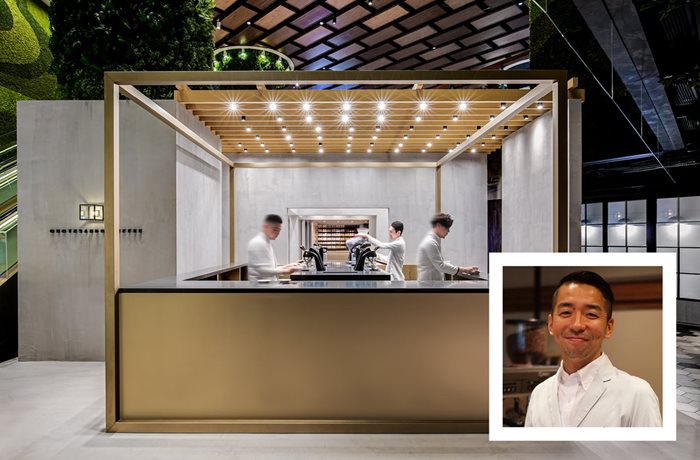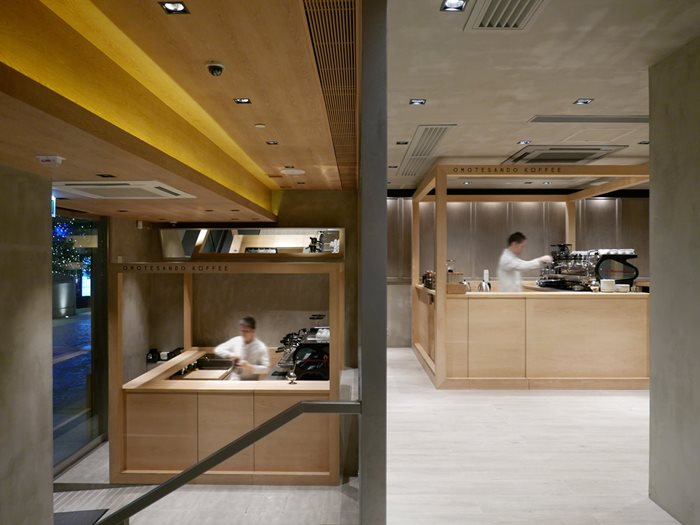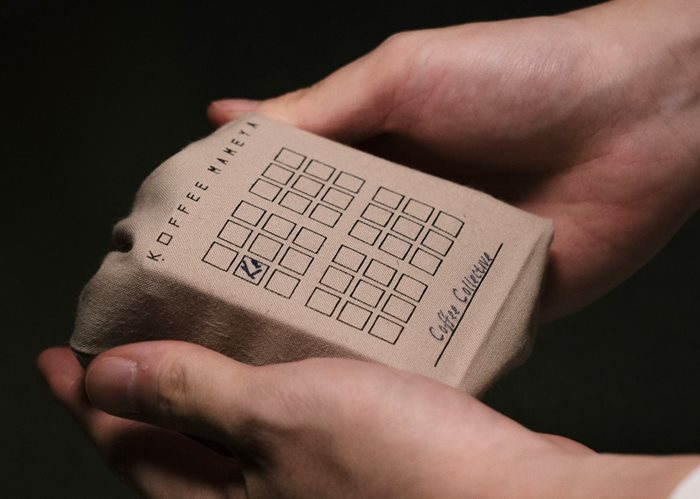Frequently lauded as the best coffee shop in Tokyo, OMOTESANDO KOFFEE and its sister retail business KOFFEE MAMEYA have garnered near legendary reputations for delivering highly curated hospitality experiences that place customer and product at the very centre of the brand’s artisanal ethos

Main image: K11 MUSEA store, Hong Kong | Inset: Eiichi Kunitomo, Founder, OMOTESANDO KOFFEE | All images courtesy of OMOTESANDO KOFFEE
From humble beginnings as a single coffee shop in a Tokyo suburb, OMOTESANDO KOFFEE has grown into an internationally acclaimed boutique coffee chain and retail coffee business with nine sites across Japan, Singapore, Hong Kong and the UK.
With his painstaking approach and uncompromising resolve to deliver each customer’s perfect cup of coffee, the brand’s visionary founder Eiichi Kunitomo built his business on the principles of
shokunin – the Japanese concept of an unflinching, lifelong dedication to one’s craft. The result is a coffee brand that is simultaneously steeped in Japanese history and tradition while remaining firmly on the pulse of international specialty coffee culture.
Tell us about your backgroundand what inspired you to get intothe business of coffee
My career began as a restaurant server, although my relationship with coffee did not begin until the restaurant’s barista quit and I had to fill in for him. It was from there that my curiosity for espresso grew and I began peeling back its layers, from taste to texture, aroma and colour.
Gaining this experience allowed me to forge my path in the coffee industry. Ultimately, I wanted to share all the beautiful aspects of coffee, increase awareness, and improve quality in Japan’s specialty coffee market. I felt there was a story to tell and everything prior was just the prelude. I believe that food and beverages are elevated through the stories we share, and so I began my first chapter with OMOTESANDO KOFFEE.
For OMOTESANDO KOFFEE, it was important to go back in time and incorporate key elements of Japanese culture and tradition – artisanship, the way of
shokunin (craftsmanship), and
omotenashi (hospitality).
"Attention to detail is universal to the success of any hospitality business"
Through this methodology, we allow our customers to focus wholly on the coffee and eliminate all unnecessary external factors. In developing the ideal espresso bar, I was inspired by traditional Japanese tea ceremonies, where guests are served on a square
tatami mat. This process, while intimate, is highly professional and very much about human connection and respect.
Having built our home in Tokyo, we then successfully transferred this concept into overseas markets, such as Hong Kong, Singapore and London.
After more than six years developing OMOTESANDO KOFFEE with my partners, our attention turned to helping customers find their ‘perfect cup’. This propelled us to develop our sister brand KOFFEE MAMEYA, a retail specialty coffee shop. Here, customers can explore the unique qualities of each coffee origin. Our baristas help connect customers to both domestic and overseas roasters to match them with their ‘perfect cup’ based on their taste preferences. In 2020, we opened KOFFEE MAMEYA’s first international store in the beautiful K11 MUSEA Hong Kong.
How has the Japanese coffee shop market developed since you began trading in 2011?
The Japanese coffee market has been rather stable for as long as I can remember. However, through the influences of social media and increased attention towards global coffee trends, the domestic market entered a new phase from around 2011 and has been developing in its own unique way ever since. The overall consumption of coffee has steadily increased and there is growing interest in specialty coffee and home brewing.
This gradual shift in consumer habits has created new audiences for specialty coffee brands, especially among younger generations. This positive disruption has led to an overall rise in quality and higher demand for the premium coffee products we source. Overall, this has been a very positive process and has added immense value to Japan’s coffee culture.

OMOTESANDO KOFFEE, Lee Tung Avenue, Hong Kong
How has Japanese culture influenced your vision for building an international coffee brand?
We must go back to the Edo period (1603-1868), when Edo (present-day Tokyo) became a centre of artistic and culinary excellence. There is an old saying in Japanese, ‘a mochi shop is a mochi shop’, which means, if you’re lost and in need of guidance, seek a professional in their field.
As
shokunin, we devote many years of work to master our craft, which often requires dedicating one’s entire professional life to the pursuit of perfection. To the overseas reader, sushi is probably the prime example. Sushi masters are constantly focused on improving their skills and precision. Their mission is to provide an unforgettable experience to the customer at all times. This traditional, yet undying belief has helped shape the Japanese coffee scene today.
At OMOTESANDO KOFFEE, we have adhered to this philosophy – from our store design, layout and service – to the mindset that we can always improve our quality in pursuit of perfection.
In our international markets, we believe it is important to celebrate these aspects of Japanese culture and style, while being mindful of the local consumer. However, I believe a focus on attention to detail is universal to the success of any hospitality business, not subject to a specific culture or tradition. This belief has helped build the foundation of OMOTESANDO KOFFEE.
"I believe that food and beverages are elevated through the stories we share"
What have been some of your biggest business lessons learned from scaling your brand internationally?
Stay true to your identity, but be respectful of your audience. The brand is our identity, so it is important we keep a strong sense of who we are and what we represent. By maintaining our philosophy, we must educate the local staff and have consistency in taste and service.
This can only happen through strong communication and trust. As a coffee business, our product is of utmost importance. However, it is also vital to emphasise the role of the team, whom the business relies upon to deliver the final product. How that product is delivered is entirely down to that entrusted individual. It has been a difficult year for the entire coffee community, so more than ever, we need to trust our team, work with our neighbours, and provide a sense of comfort to our customers.

KOFFEE MAMEYA retail packaged coffee branding
Do you see any positives emerging from the Covid-19 crisis?
We strongly believe that in order to pursue the beauty of hospitality, a clean and safe environment is always necessary — regardless of the pandemic. However, it has definitely been a period of reflection. We understood that through difficult moments, we needed to reaffirm our values as a brand, while remaining assertive towards our customer within a professional environment.
What is true for both OMOTESANDO KOFFEE and KOFFEE MAMEYA is that it is very much based on the individual and personal experience and so we did not feel the need to particularly alter our concept or business model. Of course we had to abide by local government restrictions and social distancing measures.
We managed expectations and stuck to our strengths. It has definitely been a tough year. Although, I do believe through most tough moments comes opportunity. We must all remain optimistic.
Can you tell us about any new developments for Omotesando in the coming year?
The pandemic has put many of our developments on hold. The numerous delays and uncertainties do not help. Although we have confirmed upcoming stores in new and emerging markets, such as The Philippines and Malaysia. We continue to build and extend our brand outreach in existing markets, such as Tokyo, Hong Kong and London — through a new line of merchandise and additional stores.
We aim to double our operating stores in the first quarter of 2022. Our Hong Kong team will also launch a new collaboration with the much-anticipated relaunch of Four Seasons Hotel (HK) later this year, which we are very excited about. There is much to look forward to in 2021 – of course we anticipate more difficult times ahead – but we’ll get through this together, one coffee at a time.
This article was first published in Issue 6 of 5THWAVE magazine.
Subscribe to 5THWAVE to receive each edition in print and digitally or sign up to our newsletter and be the first to read the latest articles and updates on World Coffee Portal research
